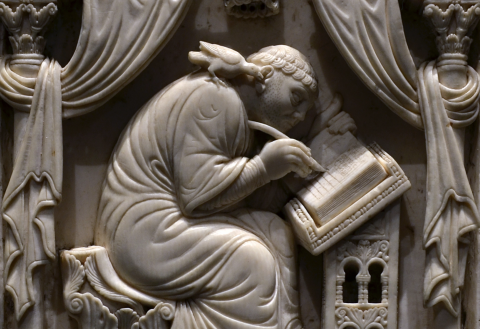Celia Schultz, cnewlands, and rcaston
March 11, 2018
Authors: Celia E. Schultz (University of Michigan), Carole E. Newlands (University of Colorado), Ruth R. Caston (University of Michigan)
One night over dinner at the SCS in Toronto (2017), conversation turned to one of the more frustrating parts of standard graduate programs in Classics: the surveys of Greek and Latin literature. Students see these courses as great hurdles to leap over, and faculty (well, at least we) felt that their necessarily selective approach is undesireable and that the courses cannot possibly do justice to all the important goals set for them: improving students’ command of the languages and their speed in reading, preparing students for exams, giving students a sense of the chronological development of the classical literary tradition, and introducing them to important trends in scholarship. Perhaps spurred on by the wine, we decided to see if anyone else felt the same way and to see if we could get a conversation started about how to improve the experience of survey for everyone.
We invited ten colleagues to share syllabi and to take part in a workshop, cleverly entitled Graduate Literature Surveys, at the Annual Meeting in Boston (2018). We aimed for a balance between specialists in Greek and Latin literature, those hailing from larger public universities and from smaller private ones, from PhD- and MA-granting institutions. We also aimed to have representatives from many different regions of the country and, since we all tend to teach the way we ourselves were taught, we worked to make sure we invited people who had done their own training in many different places. In the end, the weather kept about one-third of the invited participants away, but enough other folks showed up to hear the session that we were able to enjoy a lively conversation and learn a thing or two, or six.
- Surveys are not going to disappear any time soon. While some expressed interest in doing away with literature surveys altogether and at least one person in the room had trained in a program that did not include such courses (and felt it had not impaired her professional development in any way – or at least not much), it was clear that the majority of workshop participants felt surveys were an essential element of the Classics graduate curriculum. Not only is the sense of the sweep of ancient literature conveyed by survey essential for a budding classicist (whether literary scholar, historian, or philosopher), but survey is for some of us the only opportunity to introduce students to the non-canonical or less popular authors we study. For many students, survey will be their one interaction with anything from the Hellenistic period, the Second Sophistic, or Late Antiquity.
- Not everyone should take a survey course in the first semester. Diagnostic exams should be given at the start of the new school year, and those newbies who do not fare well should be allowed to put off survey until they’ve had a chance to get some reading courses under their belts. This means that the program requirements have to be structured to allow a delay.
- Scaffolding is absolutely essential. In the interest of getting through as much material as can be crammed into one term, the goal of improving reading accuracy and speed sometimes falls by the wayside. The most successful survey courses come with scaffolding – other courses offered alongside them that focus solely on reading (whether prepared passages or reading at sight, but ideally both). Seminars alone are insufficient to the task. In addition, a proseminar is a good place to tackle such issues as how to read an apparatus criticus and how to use other standard research tools.
- Survey works best when it is arranged in chronological order. Some at the workshop had experimented – unsuccessfully – with organizing the course by genre, but found that students really need the strict chronological framework to get any sense of development of the literary tradition as a whole. This can be done even if one does not start right at the very beginning, where one is forced to deal with fragments, which are particularly difficult for students to get a handle on. Some have had success beginning with a later author chosen as a particularly good paradigm for the goals of the course, such as Vergil, who is endowed with an early and rich commentary tradition, or Cicero, whose writings, rich as they are with citations of earlier texts, are particularly good for introducing students to (among other things) the ways one might handle fragments. The class can then turn to earlier, more fragmentary works later on in the semester, after students have got their bearings. As a way of gauging what they do and do not know at the beginning of term, one participant asks students to arrange chronologically a jumbled list of important historical and literary events on the first day of class. They work on this as a group with no instructor in the room and no accessing the internet on their phones: the results can be illuminating.
- Every class session and every assignment should be designed for maximum efficiency. Texts read in survey (and the supplementary courses) should have good commentaries available and should usually come from the reading list, with the caveat that texts on the reading list should not be the only options. While we were on the topic of reading lists, we agreed that they should be reevaluated every few years: trends in scholarship change, new commentaries come on market, faculty interests shift.
In order to minimize time spent on lecture and to maximize discussion of texts, students can be sent to read the Oxford Classical Dictionary or handbook articles on individual authors.The group was also clear that survey is not the place for large research projects.Instead, students can, with profit, be made to give short presentations such as an introduction to an author, including building a basic bibliography, or a critique of an article.These can teach research and/or critical skills in a relatively low-stakes way.Another suggestion was to ask pairs of students to analyze and discuss a passage and then present it to the class. Short written assignments can be fit into the term: suggestions included having students each write up an idea in three pages and then present to the class, having students write a commentary on a passage read for class, or having students write a review (or give a presentation) on a handbook. Canvas and other online platforms can be useful for priming in-class conversation by requiring students to post questions / thoughts the night before class.There was less unanimity about the value of on-line translation quizzes: most felt that in-class quizzes were the way to go.There was consensus that weekly quizzes keep the students honest about the readings.
In some programs, the final exam for the survey course is counted as one of the qualifying exams for the program.
- Be honest about how incomplete the course is. No survey course can cover the whole of a literary tradition, or even half of it. While we varied widely in how many authors we cover in a given term, the participants agreed that instructors should teach what they know best in order to teach well. We also agreed that (a) instructors should be clear that the class is only covering a small selection of interesting, important texts from the ancient world and (b) they should be transparent about how the selection was made.
(Header Image: Saint Gregory the Great and his scribes, 10th c. CE. Ivory relief from the cover of a sacramentary. Now in the Kunsthistorisches Museum in Vienna. Licensed under a CC-0).
Authors




